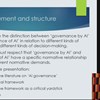minimally
Studies on climate ethics and future generations vol. 5
Working papers 2023-1-11 Tim Campbell & Olle Torpman (eds.) 1. How to Feel About Climate Change? An Analysis of the Normativity of Climate Emotions Julia Mosquera & Kirsti Jylhä 2. How to Value a
Workshop: Global Health Impact
Every year nine millionpeople are diagnosed with tuberculosis, every day over 13,400 people areinfected with AIDs, and every thirty seconds malaria kills a child. For most ofthe world, critical medica
Eva Erman: Artificial Intelligence and the Political Legitimacy of Global Governance
Research seminar with Eva Erman. AbstractThe study of the social and ethical impact of AI is still in its infancy and contributions to the field have to keep up with the continuous developments of the important procedural aspects of good AI governance. One of the most important properties of good governance is political legitimacy. Starting out from the assumption that AI governance should be seen as global in scope, this paper has a twofold aim: a) to develop a theoretical framework for theorizing the political legitimacy of global AI governance and b) to demonstrate how it can be used as a critical yardstick for assessing the (lack of) legitimacy of actual instances of AI governance.

Eva Erman: Artificial Intelligence and the Political Legitimacy of Global Governance
The study of the social and ethical impact of AI is still in its infancy and contributions to the field have to keep up with the continuous developments of the booming AI industry. Though it is widely
CANCELLED! Cécile Laborde: Is the Liberal State Secular?
Cécile Laborde, Professor of Political Theory FBA, Nuffield Chair of Political Theory.ABSTRACTIn this talk, I ask whether liberal legitimacy requires secularism – or separation between state and relig
Discontinuous and continuous stochastic choice and coordination in the lab
Journal of Economic Theory, vol. 206, 2022. Abstract We experimentally test theoretical predictions on equilibrium selection in a two-player coordination (investment) game. Through a minimal visual vari
The Repugnant Conclusion: An Overview
In Stephen M. Gardiner (red), The Oxford Handbook of Intergenerational Justice, Oxford Academic. Abstract The repugnant conclusion can be formulated as follows: For any population consisting of people wi
Counterradicalization Interventions. A Review of the Evidence
Research report 2022/1, 70 p. Counter-radicalization has become part and parcel of the counter-terrorism strategies of virtually every western nation. Most counter-radicalization efforts build on the a
Erik Angner: Nudging as Design
Erik Angner, Professor of Practical Philosophy Abstract The nudge agenda due to Richard Thaler and Cass Sunstein has proven polarizing. To advocates, nudging allows us to improve people’s choices and th
Lukas H. Meyer: Fairness is most relevant for country shares of the remaining carbon budget
Lukas H. Meyer, Professor of Philosophy at the University of Graz, Austria, and Speaker of the Field of Excellence Climate Change Graz, the Doctoral Programme Climate Change, and the Working Unit MoraIn my talk I argue that fairness concerns are decisive for eventual cumulative emission allocations shown in terms of quantified national shares.I will show that major fairness concerns are quantitatively critical for the allocation of the global carbon budget across countries. The budget is limited by the aim of staying well below 2°C. Minimal fairness requirements include securing basic needs, attributing historical responsibility for past emissions, accounting for benefits from past emissions, and not exceeding countries’ societally feasible emission reduction rate. The argument in favor of taking into account these fairness concerns reflects a critique of both simple equality and staged approaches, the former demanding the equal-per-capita distribution from now on, the latter preserving the inequality of the status-quo levels of emissions for the transformation period. I argue that the overall most plausible approach is a four-fold qualified version of the equal-per-capita view that incorporates the legitimate reasons for grandfathering.








